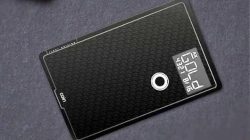Although many of us apply for lots of credit cards for the sign-up bonuses, some also keep those cards for long-term use as part of a strategy to maximize the bonus miles in every possible purchase category. I use my Amex Premier Rewards Gold card for 3X points on non-United flight purchases and 2X points on grocery purchases. My Sapphire Preferred is for hotels, car rentals, and other miscellaneous travel, as well as restaurants. My grandfathered United MileagePlus Select card is only for buying United flights, which earn 3X miles and 1 PQM (up to 5,000 PQM per year).
But keeping track of all these cards is tough, let alone finding room for them in your wallet. Sometimes the choice of card depends on a specific brand within a larger category, or whether your purchase is within the U.S. or international. I have an old watch tin stuffed full of credit cards and loyalty cards. Only four go in my wallet, and sometimes that means I’m not in a position to use the best card for a certain purchase.
Coin is a Y Combinator-backed startup that may just have a solution to that problem (HT to Slashdot). They’ve spent the past couple years working on a prototype device that will allow you to store multiple cards on a single piece of plastic and metal, switching between the cards you want to use for each purchase.
I actually had a similar idea not long ago, but I didn’t do anything about it. Story of my life. 🙁
Whatever Happened to Walla.by?
If Coin sounds a lot like Walla.by, it is — but with crucial differences that I think make Coin more useful to a person like me and also more likely to succeed. Last I heard, Walla.by was in talks with MasterCard to create a single credit card that you could use for all transactions. (It seems to still be in private beta, and the logo of MasterCard or another payments processor is notably absent.) You would store your card information with Walla.by, and it would automatically detect the merchant category you were dealing with and re-route the purchase to the best card in your digital wallet. There are problems with this model, however.
If you only use a card for optimal use scenarios, card issuers make less money because you are reducing the average return on each transaction. They need some lazy people to get 1 mile per dollar on 90% of transactions to be able to fund the 2 miles per dollar on the remaining 10%. I’m also pretty sure Walla.by crosses the line into comparing card issuers, explicitly or not, which they don’t like.
Second, Walla.by needs money to pay for this. There are the regular transaction fees charged by the ultimate purchase card. There are also transaction fees for the MasterCard-branded plastic that you carry around to initiate each charge. I recall they wanted around $89 a year in a subscription model, though Amol’s interview suggests $50.
I think the people who care most about optimizing their purchases and would be willing to use such a product are already doing a pretty good job of it on their own. What we really need is a way to organize the cards, not tell us which one to use. And I really want to avoid paying every year to keep it going. (Technology breaks down, too. The cost might be the same if I have to buy a replacement Coin. Still, I am a control freak and continue to prefer the option of picking my own payment method each time rather than let a third party choose for me.)
Coin Is Different
What makes Coin cool is that they don’t need the banks on board. There is no intermediate payments processor. Much of the information you need to complete a purchase is already encoded in the magnetic strip. Coin directly stores this information in a small processor. You then turn on Coin when you want to make a purchase and switch to the card you want to use. The information is loaded onto a dynamic metal strip within Coin, and you can refresh that information with a different card when you want to switch payment options.
You need an iPhone or Android to load your card information. It’s apparently as simple as taking a picture with your phone and then swiping the card through an adaptor. It can also alert you when you’ve left your card behind at a restaurant.
The only immediate issue I see with Coin are that sometimes a merchant wants to see the card in person to check the name, signature panel, or the extra three- or four-digit security code. You probably want to carry a backup. But two cards (Coin + backup) is a lot better than dozens.
Check out the video below to learn more. Coin is currently taking pre-orders at $50 each plus $5 shipping. I think a flat fee of $55 with no obvious regulatory issues and arguably better privacy is a good deal. When Walla.by finally starts taking orders, I’d try that, too, but Coin is closer to what I have been looking for.
Disclosure: If you sign up for Coin using my referral link, I get $5. No clue how they get it to me or what form it comes in, but I think it’s a cool product nonetheless.





